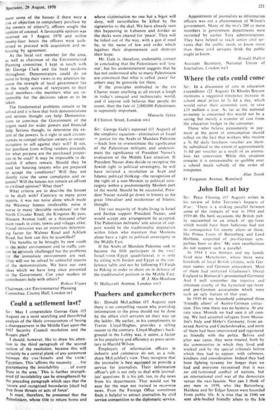John Bull at bay
Sir: Peter Fleming (15 August) writes in his review of John Terraine's Impacts of War: 'There is a striking parallel between some of the impacts of war in 1914 and 1939-40. On both occasions the British pub- lic succumbed to an attack of spy-fever which would have been ludicrous had not its consequence for enemy aliens or those. like Prince Louis of Battenberg and Lord Haldane, suspected of pro-German sym- pathies been so dire.' My own recollections do not support such a parallel.
In 1914 I was thirteen and my family lived near Manchester. where there were hundreds of loyal British citizens, with Ger- man names and German antecedents. Most of them had preferred Gladstone's liberal England to Bismarck's prussianised Germany And I well remember the injustice and inhuman cruelty of the hysterical spy-fever and pro-German accusations which were such an ugly feature of that year.
In 1939-40 my household contained three 'friendly aliens' of Austro-German extrac- tion. This lime there was no hysteria. At any rate since Munich we had seen it all com- ing. We had accepted refugees from Musso- lini's Italy and Hitler's Germany. from an- nexed Austria and Czechoslovakia; and most of them had been interviewed and registered as friendly with the police. Before and after war came, they were treated, both by the communities in which they lived and worked and by the special tribunals before which they had to appear, with calmness, kindness and consideration. Indeed they had been fighting tyranny for longer than we had and everyone recognised that it was no old-fashioned conflict of nations, but an international civil war of the democrats versus the nazi-fascists. Nor can I think of any men in 1939, who like Battenberg. Haldane and Sir Edgar Speyer were hounded from public life. It is true that in 1940 we sent able-bodied friendly aliens to the Isle of Man, but this was as much in their own interest as in that of the allied war efforts For if the Battle of Britain had gone the other way and enemy troops had landed in England, they might have been savagely misused.































 Previous page
Previous page